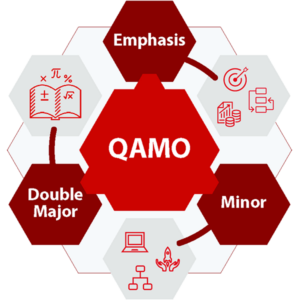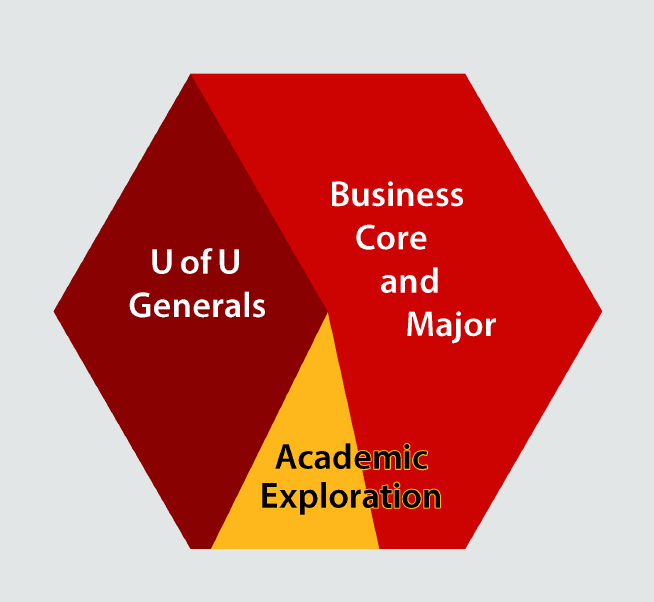Designed to Combine
Broad interests? No problem! QAMO gives you space to explore
QAMO is built from the ground up for students who want options. Requiring only 40 to 50 credits (depending on your math preparation), the QAMO major allows space in your schedule to pursue a variety of interests.
Craft a unique college experience by combining QAMO with an emphasis, minor, double major, or honors. Nearly half of QAMO majors declare a minor or an emphasis within the David Eccles School of Business. Another third opt for a minor outside the School of Business. Around a fifth declare a double major. And QAMO is honors-friendly, with a large fraction of graduates completing an honors thesis.

13
Optional Business
Minors/Emphasis
~100
Double-Major
Combinations
~90
Non-Business
Minors
QAMO and…
Our QAMO classrooms are full of intellectual diversity. On the left sits a student double-majoring in QAMO and Computer Science (CS), headed for a data science career. On the right, a classmate is earning a QAMO and an English minor, applying to law school. In the back? QAMO and a Finance Emphasis, just returned from a Wall Street internship. The kid in the front? QAMO and Honors, halfway through a year-long honors thesis project.

…a business minor or emphasis…
Is your heart set on marketing or finance, but intrigued by QAMO? No problem! Our QAMO program combines effortlessly with topic areas within the David Eccles School of Business. QAMO students can pursue any of the nine minors offered by the Eccles School, with Advanced Financial Analysis and Information Systems as popular choices. And we have built areas of emphasis for business topics that don’t offer a minor. For example, QAMO with a marketing emphasis pairs QAMO quant skills with upper-division marketing coursework. Around half of QAMO majors pursue a minor/emphasis within the Eccles School.
… a non-business double major or minor…
Many of our QAMO students have one foot in the Eccles School and one foot out. Around 20% of QAMO students declare a non-business double major, with Math, Computer Science, and International Studies as top choices. But don’t hold your imagination (and interests) back – current students are also doubling in English, Japanese, Biology, and Psychology, to name just a few. Another 30% of QAMO students declare a non-business minor, with Math, Computer Science, and Political Science leading the pack. But hey, college is short – so why not minor in Music Technology, Cognitive Science, or Philosophy? With QAMO, you’ll be able to fit in all your interests.


…an honors degree.
Among business majors, QAMO typically has the highest proportion of students graduating with honors. A QAMO Honors Thesis is a year-long effort in which students take on an independent research project under the supervision of a professor. QAMO’s focus on data lets students pursue their interests while enhancing skills they’ve developed in the major. Past research topics include behavior of not-for-profit hospitals, attendance patterns in minor league baseball, the effects of incentives on performance for tech-industry salespeople, and the impact of water pricing on residential usage.
Analytical Depth with Room to Explore
QAMO is designed to combine because it leaves space in a student’s schedule for exploration. The tradeoff? QAMO does not require the BCOR business courses that focus on the various functional areas of business. So, while QAMO offers analytical depth and a business econ focus, the other business majors offer business breadth with a full set of courses in functional business areas such as Marketing, Management, Operations, Finance, and Accounting. Requiring only 40 to 50 credits (depending on your math preparation), QAMO gives students more room to choose their college experience.
Of course, QAMO majors can still access highly sought-after skills in functional business areas. Around half of QAMO majors select a business emphasis or minor. This results in a strong combination of skills: analytical depth from QAMO and functional business knowledge from the emphasis or minor.
QAMO Major
122 credits to graduate

Business Major
122 credits to graduate

Major Focus:
The QAMO program offers analytical depth with ample room for electives. The Eccles School business majors offer business breadth with a focus on business core courses.
“Econometric analysis and intuitive microeconomic thinking have given me an edge in applying for jobs in consulting and the policy sphere that I would never have gained anywhere else on campus.”
Chase Parry
QAMO Major,
Political Science and International Studies, May 2025


“My interest in pursuing the QAMO major is actually what lured me to the University of Utah. I was excited to learn of a program that taught economics with an emphasis on business.”
Kade Bessert
QAMO Major,
Minors in in Accounting and Advanced Financial Analysis, May 2025
“Through QAMO, I have found multiple internships in different industries, and it has shown me that I can pursue my passion for data and problem-solving anywhere I want.”
Grace Peters
QAMO Major,
Minor in Information Systems, May 2025

“The QAMO program allowed me to pursue both my academic interests, double- majoring in QAMO and math in just XX years.”
Annie Alumna
BS, QAMO 2021

“With QAMO you have enough room and freedom in your academic schedule to diversify your education to be more competitive in niche positions.”
Bradley Bigbrain
BS, QAMO 2021





